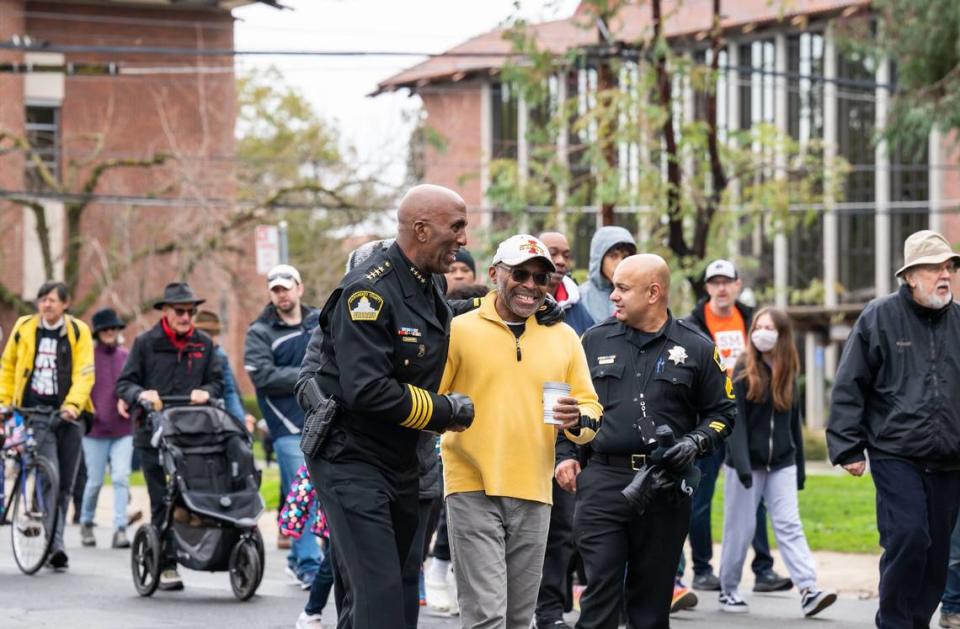After one year as Sacramento County sheriff, Cooper reflects on progress, priorities and more
Sacramento County Sheriff Jim Cooper, freshly elected to command the largest law enforcement agency in the Central Valley, chatted and shook hands with dozens adorned in red, white and blue flocking this year to Rancho Cordova’s Fourth of July parade and the city’s 20-year birthday celebration.
But just a couple of hours later, the county’s top peace officer — responsible for more than 2,300 employees and a $695.3 million budget, the most of any one agency in the capital region — managed to be among the first to arrive at Franklin Boulevard to investigate a deadly shooting.
“You want to have your finger on the pulse of your agency,” Cooper said during a recent wide-ranging interview with The Sacramento Bee one year after taking office.
TCooper, 59, has worked in both the law enforcement as a deputy and in the Capitol as a legislator, and knows the rigors of both worlds. He’s attended briefings for almost every division in the Sheriff’s Office to crystallize his vision. His expectations are specific and broad. He said he has told deputies to clean writing off jail cell walls; he has told them to be aware of the intense overall scrutiny they face and how they should act on patrol.
“I want to know — I want to see it, touch it, smell, feel it so I know what’s going on when I’m making these decisions. Because my decisions impact a lot of people,” Cooper said from Sheriff’s Office headquarters in Old Foothill Farms.
Cooper promised in December 2022 to herald “much-needed change” upon his controversial predecessor’s departure. Cooper, a Democrat and former Elk Grove Assemblyman once called law enforcement’s biggest advocate in the state capital, infuses his politically honed instincts with experience forged by a 30-year career wearing a badge.

That approach explains why Cooper showed up to a July 4 shooting in which a man died and another was critically injured near Bowling Green Park in south Sacramento, said Sacramento Sgt. Amar Gandhi, a spokesman for the Sheriff’s Office. He happened to be nearby and came to stabilize the scene because other units were handling other calls, Gandhi said.
The county’s first Black sheriff, Cooper won outright over then-Undersheriff Jim Barnes in the 2022 primary election. Former Sheriff Scott Jones, whose 12-year tenure included locking out the county’s inspector general, opted to run instead for a congressional seat. The Republican lost to Rep. Kevin Kiley, R-Rocklin.
While Cooper has demonstrated a hands-on approach to effecting change, he’s also publicly challenged others on hot-button issues. They include community activists on homelessness, the California Retailers Association over retail theft and the Board of Supervisors on fentanyl smuggling in the Main Jail downtown.
Critics have called on Cooper to do more in the fields of equity and transparency. Sonia Lewis, a community activist with Liberation Collective for Black Sacramento and Decarcerate Sacramento, said she hasn’t seen much change under Cooper to make the Sheriff’s Office, or its records, more accessible to the community.
“He has not made the necessary changes to enhance the lives of people of color,” Lewis said of Cooper in his first of the four-year term.
Meanwhile, some of the targets of Cooper’s criticisms have issued sharp rebukes. But others have vowed to keep working with him, saying he’s had a positive effect on the Sheriff’s Office.

Homelessness a top priority as sheriff
In his campaign, Cooper promised homelessness would be a top priority even though he was leaving the Legislature and returning to law enforcement.
The sheriff said being homeless is not a crime, but he continues to push the idea of conservatorships to help those mired in homelessness because of mental illness or drug addiction. He said it’s awful seeing homeless people “languishing,” walking in the street in and out of traffic, “eating out of a trash can.”
“That is inhumane,” Cooper said. “That person needs help. No one wants to be that way.”
He said his deputies have not conducted sweeps, moving homeless people out of public areas where they live in makeshift camps. Deputies have had vehicles towed, made arrests and issued citations when necessary. And he said his deputies do move homeless people out of private property.
“We go in, and we enforce the law in the (homeless) camps,” Cooper said. “Obviously, if you have drugs, you’re going to be cited. Or if you have guns or weapons or other things, yeah, we’re going to deal with that. But as far as sweeping and making them leave somewhere else, no.”
Cooper’s predecessor Jones was sued alongside other city and county officials for conducting sweeps during the COVID-19 pandemic that the U.S. Centers for Disease Control and Prevention urged authorities to stop such enforcement to help prevent the coronavirus’ spread. A spokesman for the Sheriff’s Office when Jones was sheriff said deputies didn’t proactively conduct sweeps.
Crystal Sanchez, president of the Sacramento Homeless Union, said she’s noticed the Sheriff’s Office has conducted fewer homeless sweeps under Cooper’s leadership — “a lot less” than her advocacy groups would see under Jones.
But Sanchez said her group has documented homeless sweeps conducted by deputies in the past year, including a February sweep in which more than 75 unhoused people were moved out of an area behind a county building along Governors Circle in south Sacramento.
The Legislature last year approved Gov. Gavin Newsom’s Community Assistance, Recovery and Empowerment Court, or CARE Court. The program creates a system of civil mental health courts and requires counties to provide treatment for residents struggling with serious mental illnesses.
But CARE Court opponents have pointed out the program did not provide housing for participants, even though it is targeted at the homeless. The program has rolled out in a handful of counties; Sacramento County is expected to bring its CARE Court online before the Dec. 1, 2024, deadline.
Cooper said CARE Court is a part of the solution — he says he believes conservatorships will work for those with severe mental illness and drug courts to compel those addicted to get into rehab programs.
“I would argue if you’re being fed, you’re being clothed and you’re in a warm place out of the elements, that’s a much better life than letting them just stay where they are and basically die,” Cooper said.
Bob Erlenbusch of Sacramento Regional Coalition to End Homelessness, which releases an annual report on homeless deaths based on its review of data compiled by the Sacramento County Coroner’s Office, said drug overdose and violence are among the leading causes of death among the unhoused. But, he said, building trust and rapport with a homeless person is the way to steer them to helpful services.
“Forced treatment or forced conservatorships simply won’t work,” Erlenbusch has said. “It has to be voluntary to be effective.”
Cooper said people opposed to any type of conservatorship “are just unrealistic” about the issue of homelessness, which has only gotten worse. Different solutions have to be explored, he said.
Sacramento County’s population of chronically homeless people, 4,003, is now the third-highest in the nation, trailing only Los Angeles and New York, according to an annual assessment from the U.S. Department of Housing and Urban Development.
In May, Cooper sent deputies to conduct a five-day homeless outreach effort. They went to areas throughout the county including homeless encampments and spoke with 198 people experiencing homelessness. The sheriff said only one person accepted the deputies’ offer of services to help them get off the streets.
He said part of the outreach effort is to gather information about the danger homeless people face, including danger from other unhoused people. Out of the nearly 200 people contacted, 69 (35%) had violent criminal histories. The deputies found that 87 of them reported being a victim of a crime (44%). The people surveyed reported 150 sexual assaults; 62 of those (41%) were initially unreported.
Cooper said some homeless sexual assault victims were reluctant to speak about the attacks with the presumed perpetrator standing nearby.
“Whether you’re unhoused or whether you have a house, you should be able to feel safe wherever you live,” Cooper said. “You have folks that were being preyed upon in that community by others.”
The deputies found that 59, or about 30% of those surveyed, were suffering from mental illness; 132, exactly two-thirds, had a drug addiction, the deputies had learned.
The deputies — in patrol uniforms with badges, tactical vests and service weapons — spoke with homeless people during the five-day operation. Cooper said the deputies were out there equipped because they also needed to be ready to investigate any crime they encountered. He said his deputies made 15 felony arrests, along with confiscating guns and drugs.
Sanchez of the homeless union has said it’s “problematic for law enforcement officers to show up in uniform and try to provide services when in the same tone they also show up and sweep individuals experiencing homelessness.” She said there’s no trust in such an outreach effort.
Cooper disagrees, saying there would be a huge influx of homeless people taking advantage of services to help them get off the streets if community outreach programs were more successful than his deputies. But he said the homeless population keeps growing.
“There’s been a lot of money that has been put forth for programs. And what we’re doing has not worked,” the sheriff said. “And until we address mental illness, until we address substance abuse, it is not gonna change the status quo. And anyone that tells you otherwise is living in a different reality.”
Retail theft: How big is the problem?
It was a series of highly critical social media posts by Cooper that spawned sharp rebukes of apparent increases in retail theft and renewed debates around criminal justice reforms.
The sheriff criticized Target and Walgreens, as well as Rachel Michelin, the president of the state’s retail organization, for hindering deputies in their efforts to stop shoplifting. Any increase in retail theft, Cooper argues, stems from Proposition 47, the 2014 ballot initiative voted into law by 60% of voters.
Prop. 47 reduced some nonviolent property crimes to misdemeanors, such as theft that doesn’t exceed $950. Cooper and other law enforcement officers take umbrage with the measure, saying accountability is lost when thieves get a ticket for shoplifting and aren’t forced to appear in court.
It’s all part of an effort to raise attention for a ballot measure discussed by retailers to change ballot initiative Prop. 47. Millions of dollars are necessary to collect signatures for a referendum, Cooper said. It’s why he wants repeat offenders to face a felony charge under the law — “just good middle-of-the-road stuff,” he said.
He cast doubt, however, on any success to alter Prop. 47 — changes would need to be approved by voters.
“I’m not overly optimistic because I’ve been here before,” Cooper said.
Cooper’s seizing his bully pulpit allowed one change to happen: Target, which refused to cooperate with deputies, then worked with the Sheriff’s Office to effectuate arrests. Target did not respond to a request for comment about a change in tack.
Lewis, who advocates for the capital region’s Black community, said Cooper is misusing Sheriff’s Office resources on retail theft operations instead of addressing the root cause behind shoplifting.
“Retail theft happens because people can’t afford what they need,” Lewis said. “You’re seeing more of it because people are more impoverished.”
Cooper said homeless people were a small percentage of arrests during a recent effort by deputies to stop retail theft dubbed Operation Bad Elf. It included deputies arresting 285 people at 12 stores earlier this month, of which 12% of suspects experienced homelessness, he said. Cooper added that most of the arrests would have never been reported by stores.
The jails run by the Sheriff’s Office also cannot house every suspect cited for shoplifting because there must be room to house violent offenders. Cooper said those arrested on suspicion of stealing from businesses often don’t show up to court and therefore aren’t motivated to get treatment help through diversion programs.
The Assembly convened a select committee on retail theft for the first time this year and the Little Hoover Commission, an independent panel, is studying the issue. Both sought data about how retail theft is truly affecting Californians, and noted there’s not a lot of data painting an accurate picture. Law enforcement — including Cooper — testified during the meeting that much of the purloined goods go underreported.
Despite the lack of data, Cooper pointed to the visual reactions to such crimes: items locked up behind glass or plastic boxes, and the shoppers who may spot someone stealing.
Those instances show there is a problem, he said.
Jail drug smuggling and medical services
In September, the Sheriff’s Office announced the arrests of six people for their alleged involvement in an operation to smuggle drugs into the jail in exchange for money.
Those arrested included Zareonna Harris, who was working on-call as a medical assistant for Avid Healthcare Services, a county contractor. She’s accused of smuggling drugs into the jail. She no longer works for Avid.
The arrests followed a Sheriff’s Office investigation into a spike in overdoses at the jail. Through September, six inmates had died, all from medical causes, and three of those deaths were suspected drug overdoses. Cooper has said several of the inmates who suffered fentanyl overdoses this year survived.
In a September news conference announcing the drug smuggling arrests, Cooper expressed his frustration over a 2018 Board of Supervisors decision to move the management of its jail medical unit, known as Adult Correctional Health, out of the control of the Sheriff’s Office. He said that’s when medical employees stopped undergoing extensive Sheriff’s Office-conducted background checks when hired.

The sheriff suggested that jail medical services be moved back under the control of his office.
“Every time someone dies in the jail, it’s my name on there. ... I’ll take blame and I’ll own it. And there’s plenty of blame for me to own sometimes,” Cooper said. “But I’m not gonna take it for that. I don’t control that. I don’t control the hiring. I don’t control any of that.”
A county spokeswoman has said contractors conduct their own background checks, and officials are working with Avid on strengthening the county’s vetting process.
Since September, Cooper said, there have been more discussions between county officials and the Sheriff’s Office about jail medical services, and the county has included his office in some decisions.
“It takes a long time to turn the ship around,” Cooper said about the changes he wants to see. ”So, we’re still doing that.”
Lewis criticized Cooper’s response to the drug smuggling discovered at the downtown jail, saying the sheriff took “no accountability.”
Dr. Phillip Summers, an emergency and addiction medicine physician, also fired back against Cooper, penning an op-ed in The Bee.
Summers, who sits on the Sacramento County Public Health advisory board where he has co-chaired the correctional health working committee, said the Sheriff’s Office is mismanaging the jail and actively impairing the health care team’s efforts.
“Sheriff Cooper misrepresents the root causes of Sacramento’s failed jail system,” Summers wrote in the Oct. 20 op-ed. “His words and actions are petty political stunts that distract from the urgency of addressing these deadly serious issues.”
Cooper reiterated that he has “zero control” of Adult Correctional Health, but he sees how that unit is run inside the facility.
“That guy knows nothing about it,” Cooper said about Summers.”He’s not working at the jail.”
Cooper now says he was never really pushing to take control of jail medical services but was raising concerns to seek changes in that unit.
“I’m not trying to land grab or empire build,” Cooper said. ”Whatever works, I’m OK with that. But something has to change.”
After Cooper’s highly critical news conference, he met with Board of Supervisors Chair Rich Desmond and the county’s executive officer.
Desmond in a phone interview said any public lambasting of the county didn’t affect Cooper’s relationship with supervisors. They’ve started having private conversations rather than expressing their frustrations in public, he added.
“So, (I) understand his frustration, but it has not derailed our efforts to work together and to improve correctional (medical services) that we provide in the jail,” Desmond said.
The county is looking to hire a new chief physician position who will oversee adult correctional health, Desmond said, adding that the decision shows how the relationship between Cooper and county leaders is successful.

What’s next for Sheriff Cooper?
As he begins his second of six years in office, Cooper said he’ll prioritize homelessness, retail theft and human trafficking issues; he’s just as focused on burnishing the image of the Sheriff’s Office from both sides of the badge.
Leaving his imprint on the department includes telling deputies to interact with inmates and talk with them. When there’s wrongdoing within the Sheriff’s Office, Cooper said he talks about why an employee was terminated. Deputies will watch use-of-force videos to have discussions about a better response, Cooper said.
“You want to talk about that — talk about the hard things,” Cooper said.
He added that deputies’ every move can be captured on video, and some residents talk to them like they’re “dogs.” But he tells deputies to not worry about someone running their mouth.
Desmond — the supervisor who represents a wide swath of Sheriff’s Office’s territory in Arden Arcade, Foothill Farms, Fair Oaks and Carmichael — said Cooper worked with the county to improve conditions for unhoused residents as well as suspects and victims of crime.
Cooper also has tried to make the working environment better for deputies, which in turn makes a more positive experience for the residents they serve, Desmond said.
“It’s always been for me ... to leave the place in a better condition than I found it,” Cooper said.


